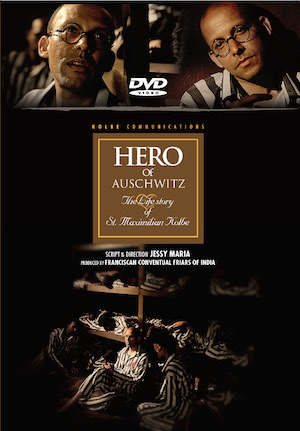Produced in India, film features Bellarmine faculty and staff
A new film on the life of Polish martyr St. Maximilian Kolbe will have its U.S. premiere at Bellarmine University on Sunday, January 29.
“Hero of Auschwitz: The Life Story of St. Maximilian Kolbe,” features two actors from Bellarmine’s faculty and staff, and was produced by a former Bellarmine campus priest.
The film tells the story of Kolbe (1894-1941) from his childhood in Poland to his martyrdom in Auschwitz during World War II, when he gave his life to save another man.

The free film premiere, at 3 p.m. on Sunday, January 29, at Bellarmine’s Cralle Theater in Wyatt Hall, will feature the film’s writer and director, Jessy Maria, and members of the cast discussing the film and Bellarmine’s involvement. Indian food from area restaurants will be available.
Filming took place in September 2016 at more than 10 locations in the Indian states of Kerala and Tamil Nadu. The 50-minute film is in Malayalam with English subtitles.
To purchase copies of the film, contact the
Young Adult Franciscan Ministry via
email.
Bellarmine’s involvement
“Hero of Auschwitz” features several connections to Bellarmine:
- Fr. Leo Payyappilly, Provincial of St. Maximilian Kolbe Province in India, and a former Bellarmine campus priest, produced the film in collaboration with the Franciscan Friars.
- Current Bellarmine campus priest Fr. John Pozhathuparambil, a Franciscan priest from Assisi Shanthi Kendra, plays the lead role of St. Maximilian Kolbe.
- Megan Burnett, the director of Bellarmine’s theatre program and a professional actor, served as Fr. John’s acting coach and also played the role of Kolbe’s mother.
“I was so blessed to act as St. Maximilian Kolbe, the great saint who gave his life for another person,” said Pozhathuparambil. “Long before this movie came to be, I edited the magazine he started, in the Malayalam language for Catholics in India, for 10 years. I also see this as a blessing.”
“Making a film in India was a surprising and dreamlike opportunity for me,” said Burnett. “Working with Fr. John, Jessy Maria, and all the crew and cast was a powerful experience. The care and attention to detail given to every aspect of this film will ensure St. Kolbe’s story will be shared with Catholics all over the world.”
The film also stars Franciscan friars, nuns, seminarians and novices, as well as professional actors from Kerala and America.
Kolbe & his ties to India
Kolbe, ordained as priest in 1918, is known mostly for his act of martyrdom in the Auschwitz concentration camp. During World War II, until his arrest, he helped provide shelter for refugees hiding from German prosecution. At Auschwitz, when guards began choosing 10 men to face death by dehydration and starvation, Kolbe took another man’s place. Kolbe was the last of the chosen prisoners to survive and, after two weeks, was executed by lethal injection.
As a child, he had a vision of Mother Mary Immaculata in which she offered him two crowns: one white to persevere in purity and one red that he should become a martyr. Raymond Kolbe lived the rest of his life in pursuit of both crowns.
He started Militia of the Immaculata, which became the foundation for printing newspapers, magazines and books about Mother Mary Immaculata. The success of these publications helped Kolbe establish Franciscan friaries in Poland (Niepokalanow) and Nagasaki, Japan (Mugenzai no Sono), along with the seeds of a friary in Kerala, India. Kolbe helped bring thousands of young men into religious life, and helped spread the word of Jesus Christ through Mother Mary Immaculata to millions in Europe, Japan and India.
The Franciscan Conventuals in Kerala have kept Kolbe’s publication efforts alive. Their company, Greyfriars Publications, distributes the Messenger of St. Anthony and publishes Amalolbhava, a monthly magazine that is a continuation of Kolbe’s Militia of the Immaculata. They have also published books on various religious subjects and saints.
Kolbe was canonized as a saint by Pope John Paul II in 1982.